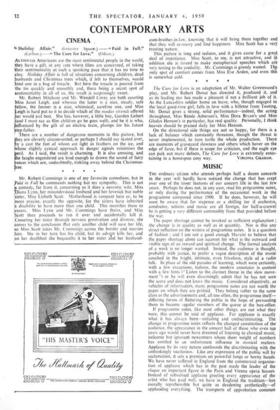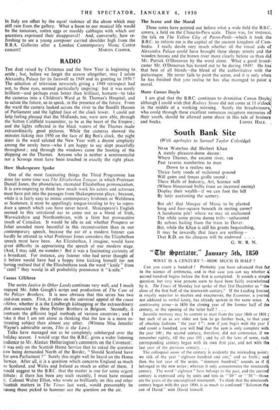MUSIC THE ordinary citizen who attends perhaps half a dozen
concerts in the year will hardly have noticed the change that has crept over one of the lesser features of our concert life in the last few years. Perhaps he does not, in any case, read his programme notes, or only during the performance of the occasional work in the programme composed since 1900. If he does, however, he will soon be aware that for sixpence or a shilling (or if orchestra, conductor, soloists and music are all foreign, for half-a-crown) he is getting a very different commodity from that provided before the war.
The paper shortage cannot be invoked as sufficient explanation ; the change is in quality as well as in quantity. Nor is this any direct reflection on the writers of programme notes. It is a question of fashion ; and I am not a good enough Marxist to believe that the paper shortage alone can account for what is the outward and visible sign of an inward and spiritual change. The formal analysis of a work is no longer wanted. Instead, the audience is thought, probably with justice, to prefer a vague description of the music couched in the bright, intimate, even frivolous, style of a radio talk. In place of the old parades of learning, which were certainly, with a few exceptions, tedious, the modern annotator is content with a few hints (" Listen to the clarinet theme in the slow move- ment ") or he will even disarmingly admit that he has not seen the score and does not know the music. Considered objectively, as vehicles of information, many programme notes are not worth the paper on which they are printed. They belong rather to the same class as the advertisements and, all too often, the programme itself— differing forms of flattering the public in the hope of persuading them to become regular members of the queue at the box-office.
If programme notes, like most other things, are not what they were, this cannot be said of applause. For applause is exactly what it has always been—unfailing and undiscriminating. The change in programme notes reflects the changed constitution of the audience, the appearance in the concert hall of those who even tep years ago would never have dreamed of listening to classical music, welcome but ignorant newcomers whom sheer weight of numbers has entitled to an unfortunate influence in musical matters. Applause by its very nature confounds the discriminating with the unthinkingly vociferous. Like any expression of the public will by acclamation, it sets a premium on powerful lungs or horny hands. We have never suffered in England from the commercial organisa- tion of applause which has in the past made the leader of the claque an important figure in the Paris and Vienna opera housei. Instead of subsidised applause greeting every appearance of the artist who has paid well, we have in England the tradition—less morally reprehensible but quite as deadening aesthetically—of applauding everything. The transports of approbation common in Italy are offset by the equal violence of the abuse which may still rain from the gallery. What a boon to our musical life would be the tomatoes, rotten eggs or mouldy cabbages with which our ancestors expressed their disapproval! And, conversely, how re- freshing to see a young composer carried shoulder high from the R.B.A. Galleries after a London Contemporary Music Centre







































 Previous page
Previous page